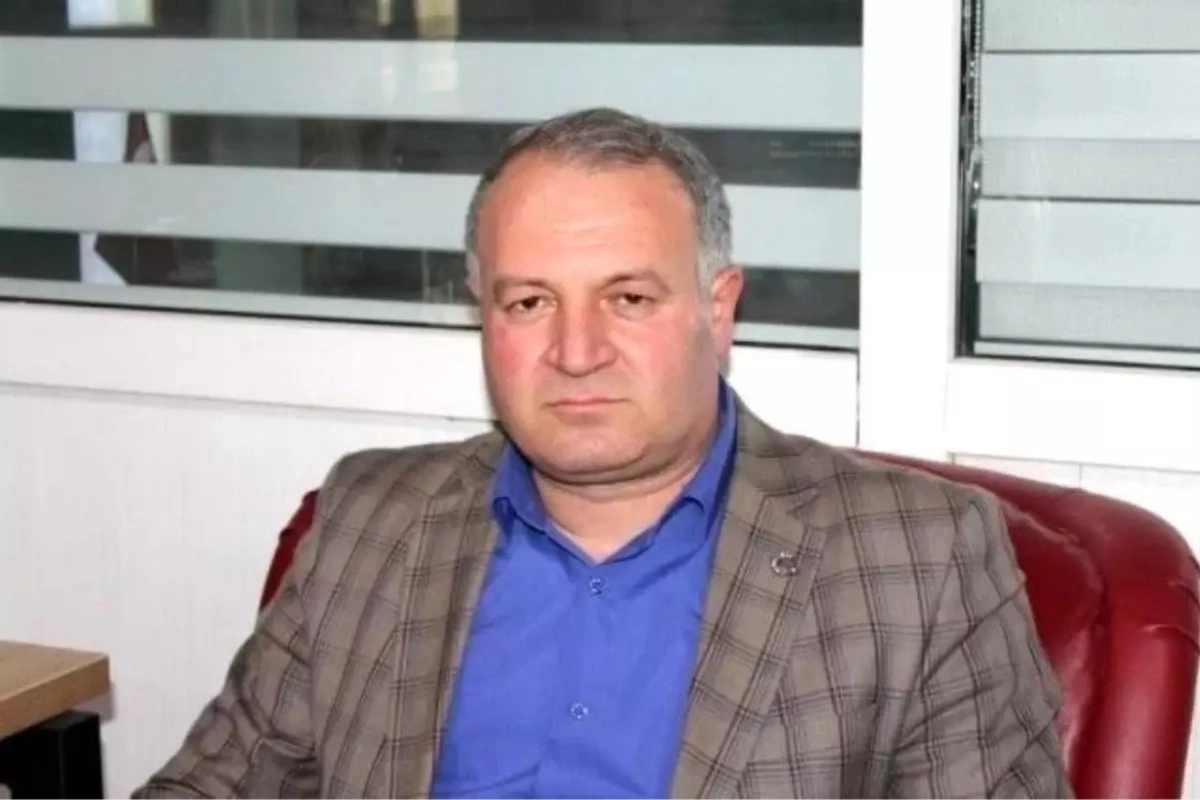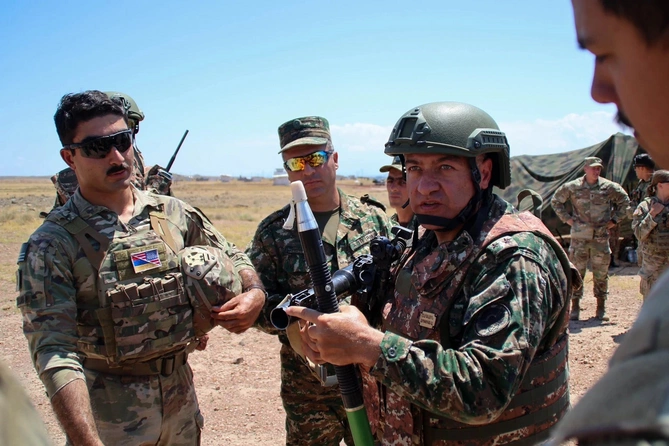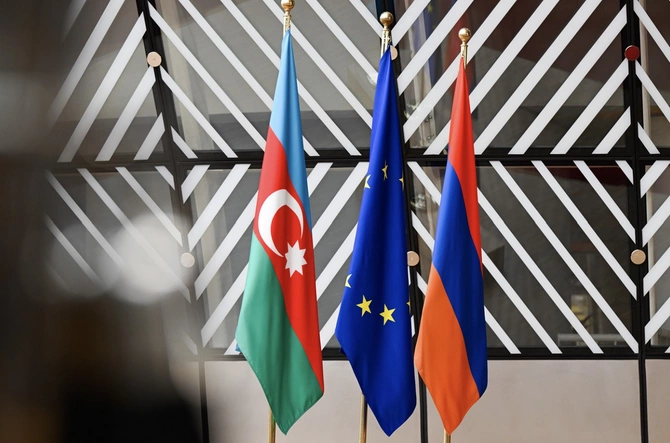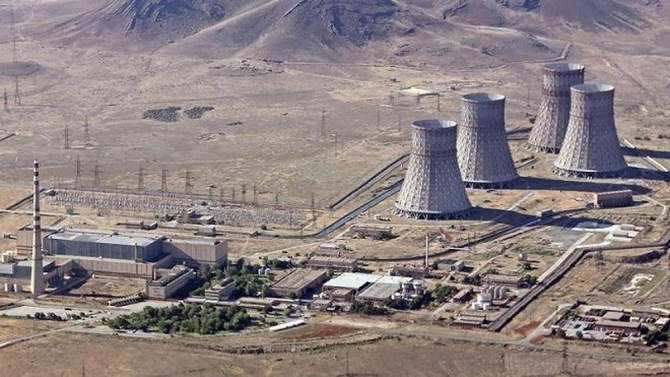
The Caspian Post presents an interview with Göksel Gülbey, Chairman of the Association for Combatting Unfounded Armenian Claims (ASİMDER), and a Turkish political analyst.
-How can Azerbaijan pursue a balanced policy in response to growing U.S. support for Armenia?
-Azerbaijan’s current policy is sound. It cannot completely detach itself from Russia, mainly because of the Zangezur corridor. The United States, in turn, has launched initiatives in the region against China-China is actually the main target, though Russia is not overlooked. In this situation, considering the importance of the Zangezur corridor, the only viable option for Azerbaijan is to maintain balance with Russia.
Azerbaijan, Türkiye, and Russia need to implement an effective and balanced strategy in the region. Naturally, the European Union and France also have significant initiatives in play. As noted, the United States aims to gain a foothold here through NATO. Evidence of this can be seen in elections and unrest in Georgia.
To avoid domestic complications in the future, Azerbaijan should show alignment with Russia and preserve balance in the region. Of course, the United States will not stay idle; it is already undertaking various efforts through NATO.
-Could the potential U.S. supply of weapons to Armenia and Armenia’s move toward NATO standards affect Azerbaijan’s defense policy?
-It would not pose a major threat to Azerbaijan’s defense strategy. The United States is not directly involved. Armenia’s primary partner in Europe is France, and they are cooperating with one another. Additionally, Armenia has a Soros Foundation office. Groups in Armenia that support Russia have already opposed such offices and even attacked them during protests. Since the U.S. does not intervene directly, it exerts influence through various funds or third countries.

Photo via US European Command
Neither France nor India would sell or provide weapons to Armenia without U.S. approval. Armenia is indeed being armed, but this is not specifically aimed at undermining Azerbaijan’s defense. Azerbaijan’s defense is already robust. Nonetheless, Azerbaijan must continue strengthening its military because the current Armenia is not the same as before. It now has new weaponry supplied by India and France, no longer relying on outdated arms from 1992. Modern air defense systems are in its arsenal.
Therefore, Azerbaijan should intensify its rearmament program in partnership with Türkiye. Air defense is particularly critical. After Israel’s Iron Dome, Türkiye is also developing similar systems, and Azerbaijan should pay close attention to these advances.
The region also faces an Iranian threat, especially as Iran is uneasy about the Israel-Azerbaijan relationship in the context of the Zangezur corridor. Meanwhile, India, a nuclear-armed state, supplies arms to Armenia, while France offers political and military support.
Given these factors, Azerbaijan must focus even more on air defense. In modern warfare, ground operations often come last. Although Azerbaijan does have a maritime boundary, airspace security and air defense systems must be its top priority.
-How might Armenia’s shift toward the West shape Azerbaijan’s relations with Russia, and what impact would it have on future peace talks between Armenia and Azerbaijan?
-Naturally, some believe Russia is entirely responsible for the plane incident, though that has yet to be definitively confirmed. The situation remains ambiguous, as though designed to disrupt relations. As progress is made on the Zangezur corridor, events like the plane crash seem suspicious. As I said, the U.S. will not vacate this space. Armenia has conducted military drills with the U.S. in the past, and we at ASİMDER voiced our reaction at the time. It was a diplomatic signal, indicating significant cooperation between Armenia and the United States.
Meanwhile, there is a strong opposition faction within Armenia that protests against Russia. In particular, one influential group supported by the Soros Foundation stands out. These are people who burn Russian flags and march against Russia’s extensive influence. The U.S. is also looking for allies there-sometimes it is Georgia, sometimes Armenia.
I do not foresee Azerbaijan clashing with Russia because Russia is the dominant regional power. Recently, a Russian TV channel ran a segment about the Zangezur corridor, taking a stance favorable to Azerbaijan, and in response Armenia filed a protest note to Russia.
I doubt these developments will affect peace talks between Armenia and Azerbaijan. The primary reason Prime Minister Pashinyan commands 70% support at home is the anticipation of opening the border with Türkiye. In Armenia, hopes of opening the border with Türkiye have always moved them closer to an agreement.
Throughout his political activity, rhetoric, and public addresses, Pashinyan has consistently spoken of opening the border with Türkiye. Türkiye, for its part, insists on the Zangezur corridor and good-neighborly relations with Azerbaijan as preconditions.

I do not believe these negotiations will significantly hinder the eventual opening of the border with Türkiye. Consider that even the 1915 genocide issue, which they championed for a century, has been set aside. Pashinyan, when discussing the diaspora, favors removing such topics from the constitution altogether. Armenia needs broad international connections. Therefore, I think it will maintain good relations with Azerbaijan and keep pursuing this agreement so it can open its border with Türkiye.
-What political or military measures might Russia take to prevent Armenia from turning to the West? Could it adopt a more aggressive strategy to safeguard its military bases in Armenia?
-As you know, Russia currently protects Armenia’s borders via the FSB, i.e., Russian military units. Although rumors suggest a withdrawal, when we visit the border near Iğdır, we see no Armenian flag on the pole-it is empty. If you look from the Iranian side, you will spot both Russian and Armenian flags as well as Russian troops. Saying there are no military personnel would be inaccurate; officers are definitely there. The number of Russian soldiers in Gyumri, formerly around 2,500, is now approaching 5,000. Hence, despite media reports about pullouts, Russia still exerts significant control.
If you consider the Metsamor Nuclear Power Plant, all profits go to Russia because Moscow granted loans to Armenia that are being repaid through the plant’s revenues. It is extremely difficult for Armenia to break away from Russia. The gas the country uses also comes from Russia. Currently, Metsamor produces around 40-50% of Armenia’s electricity, and the nuclear fuel for it is entirely sourced from Russia. Without that fuel, 40% of the nation’s power supply would be cut off. In other words, Armenia is dependent on Russia for almost everything.

Imagine that even when an arrest warrant for Putin was issued, it was subsequently retracted. I believe this is all temporary. Cutting ties with Russia would be catastrophic for Armenia-practically a death knell. Right now, Armenia is akin to the world’s largest prison camp, with most of its neighbors having closed their borders. The only way out for Armenia is alongside Russia.
Russia, for its part, cooperates with Azerbaijan and Türkiye. If it wanted, it could also restrain Iran, since Tehran is aligned with Moscow in the region. Nothing major happens there without Russian involvement. Therefore, if Armenia suddenly decides to spurn Russia and side with the U.S., it will only harm itself. It must preserve a balance. Inevitably, there will be small outbursts. Essentially, Armenia tries to pursue a policy that fits its interests: leaning toward the U.S. one day, toward Russia the next. It has no choice but to continue in this manner.
In my view, these shifts are temporary. Armenia is not strong enough to rely solely on the U.S., France, NATO, and Europe while severing ties with Russia. As of now, it lacks the capacity. Russia could block Armenia in every direction and apply tremendous pressure. Some official statements appear solely aimed at calming domestic sentiment. Armenia continues participating in all the councils, commissions, and meetings involving Russia and has not withdrawn.
-How might Armenia’s partnership with the United States affect the future of the Collective Security Treaty Organization (CSTO)? Could Russia impose economic or energy sanctions to curb Armenia’s Western ties?
-Right now, I cannot imagine Armenia decisively turning its back on Russia. Russian sanctions would be too severe. As noted, energy plays a huge role. If Russia stops supplying nuclear fuel to the power plant, it will shut down and plunge 40% of Armenia into darkness.
For instance, why is the Zangezur corridor so important to us? To free Nakhchivan from Iran’s influence. When Iran feels pressure, it threatens Azerbaijan via Nakhchivan: “I’ll cut off the gas, block the roads.” Currently, we are trying to supply Nakhchivan with gas via BOTAŞ from Türkiye, and there is already a rail connection with Nakhchivan. Once the highway through the Zangezur corridor is opened, Nakhchivan will no longer depend on Iran.
Armenia, however, has made no such moves-no alternative gas pipeline, no alternative power lines. Everything still hinges on Russia. On top of that, Armenia’s economy is heavily indebted to Moscow, and all its revenues go toward servicing this debt.
From a military standpoint, there are tens of thousands of Russian troops stationed in Armenia. If Russia opted for sanctions or, in the extreme, marched 5,000 soldiers from Gyumri to Yerevan, it could stage a coup. Armenia could not withstand that. We saw how Russia advanced to Tbilisi within hours in Georgia. Armenia simply does not have the power to oppose Russia. I do not think Armenia will actively challenge Moscow under current circumstances.
Share on social media